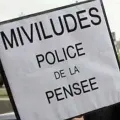The New MIVILUDES Report: Bad Methodology, Unreliable Results
by Massimo Introvigne — The MIVILUDES, the French Inter-ministerial mission for monitoring and combating cultic deviances (dérives sectaires), which is now part of the Ministry of the Interior, published last week its report for the years 2018-2020. Like Diogenes wandering with his lantern in search of an honest man, the MIVILUDES wanders around France with the anti-cult ideology as its lantern looking for dishonest “cultic deviances.” Dérives sectaires is a quintessentially French formula and invention, of which MIVILUDES is no less proud than of the Tour Eiffel. It comes out handy to find “cultic” dangers even where no “cult” (which should be translated into French with the corresponding derogatory word, secte) exists.

























